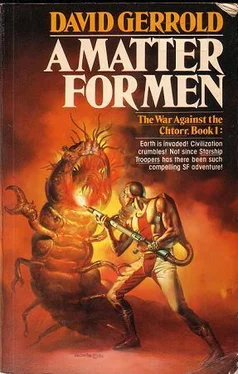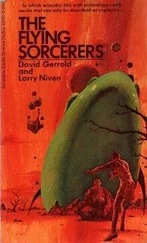David Gerrold - A Matter for Men
Здесь есть возможность читать онлайн «David Gerrold - A Matter for Men» весь текст электронной книги совершенно бесплатно (целиком полную версию без сокращений). В некоторых случаях можно слушать аудио, скачать через торрент в формате fb2 и присутствует краткое содержание. Год выпуска: 1983, Жанр: Боевая фантастика, на английском языке. Описание произведения, (предисловие) а так же отзывы посетителей доступны на портале библиотеки ЛибКат.
- Название:A Matter for Men
- Автор:
- Жанр:
- Год:1983
- ISBN:нет данных
- Рейтинг книги:4 / 5. Голосов: 1
-
Избранное:Добавить в избранное
- Отзывы:
-
Ваша оценка:
- 80
- 1
- 2
- 3
- 4
- 5
A Matter for Men: краткое содержание, описание и аннотация
Предлагаем к чтению аннотацию, описание, краткое содержание или предисловие (зависит от того, что написал сам автор книги «A Matter for Men»). Если вы не нашли необходимую информацию о книге — напишите в комментариях, мы постараемся отыскать её.
A Matter for Men — читать онлайн бесплатно полную книгу (весь текст) целиком
Ниже представлен текст книги, разбитый по страницам. Система сохранения места последней прочитанной страницы, позволяет с удобством читать онлайн бесплатно книгу «A Matter for Men», без необходимости каждый раз заново искать на чём Вы остановились. Поставьте закладку, и сможете в любой момент перейти на страницу, на которой закончили чтение.
Интервал:
Закладка:
"Yes, ma'am, we are. There's a war on." I remembered something Shorty had said and added, "It's the first invasion ever fought on American territory." I held up my disk meaningfully. "A terminal? And can we get our live specimens settled in?"
Major Bombast interrupted then. "Dr. Partridge-it's already Friday afternoon, and you have a reception and a plenary session-"
"Yes, I know." There was an impatient edge to her voice. She caught herself and smiled sweetly at him. "I'll finish up here, and you can pick me up for the briefing in-ah, forty-five minutes." The major hrumphed and disappeared. Dr. Partridge stepped to a desk and hit a buzzer. "Jerry!" she called.
Jerry was a dumpy-looking potato of a human being hiding a rubbery face behind thick glasses and a frazzle of dirty blond hair. He appeared in a smudged lab coat and was carrying a disemboweled modulator. He didn't seem to be aware that he still had it in his hands. His nametag said J. LARSON, and he wore a slightly confused frown, as if he were perpetually preoccupied in some minor befuddlement.
Dr. Partridge gave him a cloying smile. "Oh, there you are. Will you handle James and-what is your name? Ted? Will you help them out? They're here as observers."
"Oh," said Jerry. He stared at us as if we were intruders. He looked to be somewhere in his mid-thirties, but he could have been any age from twenty-five to fifty. "Do you have orders?" he asked.
I passed them over. As he glanced through them, Dr. Partridge chirped, "I know that Jerry will take good care of you. If there's anything you need, just see him. He represents me. Now, if you'll excuse me-" And she disappeared into an office.
Jerry finished reading our orders and passed them back. "Special Forces, I see." He coughed. "My uncle's in the Special Forces. My Uncle Ira."
I nodded politely. "Sorry. I don't know him. Look, can we get on with this? I need a terminal. And I want these millipedes installed under special conditions."
Jerry rubbed his nose, then looked at me with a flat expression. "I'll have to have you cleared before I can assign you a terminal and work space. It'll take two weeks."
"Oh, terrific," I said. "Look-I'm in the middle of a process here. I can't wait two weeks." I pointed to the cases on the cart. "Those eggs and millipedes have to be installed under special conditions-"
"What kind of conditions?" Jerry had stepped over to the cart and was opening the metal handling cases and peering in.
"A cool, dry place for the eggs. The millipedes too-a cool room with dim light. I can give you specific recommendations."
"That won't be necessary."
"Ahh-I strongly suggest it."
Jerry opened another case. "Why?"
"Because that's what they like." I stepped over to the cart next to him. "Use a little common sense. Look at the size of their eyes. They're all pupil. Of course they're not going to like bright light."
Jerry hmphed.
I said, "Hazy sunshine blinds them. Indoor light blinds them. Even dim light blinds them. They can maneuver in twilight or dusk, but they can only see well in the dark."
Jerry looked skeptical. "Even absolute dark?"
I nodded. "I think their eyes are heat sensitive. I wasn't able to test it, but it looks as if they can see pretty far into the infra-red."
Ted spoke up then, for the first time. "Tell him what that means, Jim."
"Uh . . ." I wished he hadn't done that. I said, "They're not nocturnal-"
Jerry looked up from the case, frowning. He shoved his hands into the pockets of his lab coat. "I don't get that."
"-on their home planet. On Earth, they have to be."
"Huh?"
"Well," I said, "it's the size of their eyes. That really suggests that they've evolved under much poorer lighting conditions than we have here. It's compensation. Either their home planet is farther from its primary, or the primary doesn't put out as much light in the visible spectrum as Sol. Or both. That makes the planet noticeably cooler than Earth; probably its temperatures range between five and twenty degrees Centigrade. Maybe it's in a long glaciation. The millipedes seem most comfortable between ten and thirteen degrees, but that depends on the amount of light hitting them."
Jerry began to look interested.
"Earth daylight is too bright," I continued. "It slows them down, even makes them curl up. At a light level approximating dusk, they're at their most active across the widest possible temperature range-that's when they really move. When we found them, they were torpid-but only by comparison. I take it to be a pretty good indication of the general level of brightness to be found on Chtorr. Hence, the big eyes."
Jerry said, "Hm," and looked back into the millipede case with studied thoughtfulness.
"If I had access to a terminal," I hinted, "I could tell a lot more. It's very interesting how sensitive to light and temperature differences these creatures are. That suggests to me that the climate on Chtorr is incredibly stable. The nights must be fairly warm in relation to the days. I'd guess that the planet has a fairly hazy atmosphere with a lot of carbon dioxide in it; that would create a greenhouse effect and keep the nights from cooling too much. I also think the planet may not have any moons-or maybe only very small ones. Nothing that can exert strong tidal effects. That would make the planet stormy, not hazy."
"Hazy, huh?" Jerry pursed his lips as he thought. His whole rubbery face deformed. "I do know a little bit of theoretical ecology," he said. "You might be right-" Then he added, "but I doubt it."
"Oh, thanks." I folded my arms across my chest. "Listen, if you know a little bit, then you know a little bit isn't enough."
He nodded his agreement. "I know. I took my degree in T.E."
"B.S.?"
"Ph.D."
"Oh." Suddenly, I felt stupid.
"Listen, I applaud your industriousness-as well as your imagination-but your theory has holes in it big enough to drive a worm through."
"Name six."
"Just one will do." He closed the lid on the case again. "If Chtorr has a hazy atmosphere, then that means they can't see the stars. If the atmosphere is hazy enough, they won't see any moons either, especially not if they're small. That means no celestial objects in the sky to attract their interest-and that means no incentive for an intelligent race to discover space travel. If your theory is correct, these bugs shouldn't be here, and neither should the worms who brought them."
"Their eyes are much more sensitive than ours," I replied. "They should be able to see celestial objects under far worse viewing conditions. Look-" I took a deep breath. "To an exobiologist, the species filling the bottom rungs of the ladder are very efficient little monitors of the physical conditions of the planet-its rotation, its temperature cycles, its light levels, its weather patterns and a thousand and six other variables. You can extrapolate the context of the ecology out of the content, if you know what to look for. Based on this evidence, Chtorr is a perpetually smoke-filled room. Or haze, or smog, or something. The point is, the atmosphere is thick and the primary is dim, but how much of each, I don't know-oh, but I can tell you what color it is."
"Huh?" Jerry's jaw dropped. "How?"
"That's what I've been working on." I tapped my disk. "It's all on here."
He blinked. "What is it?"
"It's a three-dimensional graph-the variables are temperature, light intensity and light frequency, demonstrated by millipede reactivity."
"Oh," said Jerry. He looked impressed.
"Well, hey-!" put in Ted, "What color is it?"
"It's red," I grinned. "The star is dark red. What else?" Jerry considered that. His face was thoughtful. "That's fairly well advanced along the sequence. I can see why the Chtorrans might be looking for a new home; the old one's wearing out." He looked at me. "How do you know?"
Читать дальшеИнтервал:
Закладка:
Похожие книги на «A Matter for Men»
Представляем Вашему вниманию похожие книги на «A Matter for Men» списком для выбора. Мы отобрали схожую по названию и смыслу литературу в надежде предоставить читателям больше вариантов отыскать новые, интересные, ещё непрочитанные произведения.
Обсуждение, отзывы о книге «A Matter for Men» и просто собственные мнения читателей. Оставьте ваши комментарии, напишите, что Вы думаете о произведении, его смысле или главных героях. Укажите что конкретно понравилось, а что нет, и почему Вы так считаете.












